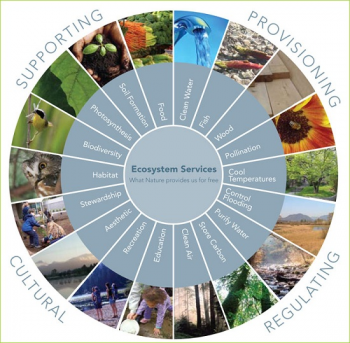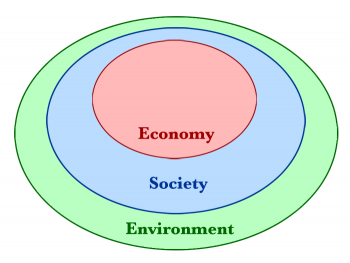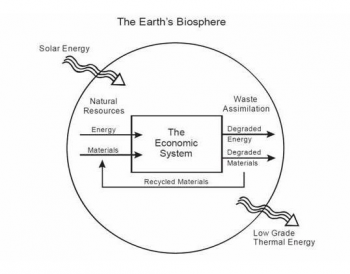Reconciling Environmental Sustainability and Economic Growth: Two Schools of Thought
By Hilary Polis
This past fall, I attended a conference hosted by the US and Canadian Societies of Ecological Economics. I am an environmental economist by training, which means that I work to develop and apply tools to express the economic value of the environment in our current capitalist, market-driven society. One way to go about this is to assign values to the services that nature provides to humans so that these “ecosystem services” can be taken into account in environmental management decisions. Some examples of ecosystem services are provided in Figure 1 below. I found that a large faction of conference attendees completely reject the theories that economics is founded upon (ecological economists), while others believe that our economic system can be reformed to address environmental challenges (environmental economists). The debate between the two groups frequently lead to animated conference discussions.

Figure 1. Ecosystem Services Examples Source: Metrovancouver.org
Environmental economics and ecological economics are two fairly distinct areas of study. Ecological economists believe that if we don’t want to become paralyzed by environmental destruction as a society, then we need to reshape our entire economy to fit within environmental limits. Figure 2 below illustrates how ecological economists believe that the influence of society should be positioned within the limits of the environment, and the influence of the economy should positioned within the limits of society. An ecological economist might argue that our current society doesn’t look like the figure below. They might say that today our economic system takes precedence over the environment and the needs of society.

Figure 2: The Ideal Ecological Economic System
Source: https://en.wikipedia.org/wiki/File:Nested_sustainability-v2.gif, Courtesy of Cornell Sustainability Campus
Achieving the goals of ecological economics would involve fundamentally changing the way that our economic system works, hence the hash tag #rethinkecon that was floating around twitter for the duration of the conference. The rationale behind this theory is that our current capitalist economic system is founded upon the pursuit of endless growth, which is not environmentally sustainable. Therefore, we need a new economic paradigm. Some of the early visionaries in this growing field include Robert Costanza, who wrote a primer on the topic titled, An Introduction to Ecological Economics, and Herman Daly, who believed in

Figure 3: The Steady State Economy
Source: https://en.wikipedia.org/wiki/File:Diagram_of_natural_resource_flows.jpg, Courtesy of Gaeanautes.
creating what he called a steady-state economy. Figure 3 illustrates the theory of the steady state economy; the main inputs of our economic system are energy and natural resources, which must eventually be converted to waste. Therefore, he argued that because natural resources are finite, the world should transition to a goal of zero-growth, both in terms of the economy and human population.
Ecological economics still remains fairly theoretical at the moment. Some ecological economic tools that might be used in the future include new types of accounting systems that incorporate environmental and social goals and would be meant to take the place of Gross Domestic Product, or GDP, indicators. These accounting systems are becoming hot topics as one article recently featured in the Economist discusses how GDP is an out-of-date method of measuring standard of living in our modern service-oriented and digital economy. Another Economist article provides some solutions for improving GDP using new types of data, accounting for inequality, and providing values for goods like environmental benefits and new scientific ideas.
Environmental economists on the other hand, acknowledge that our market-driven economic system can create certain incentives that lead to environmental destruction. For example, a factory might pollute a river downstream from a salmon hatchery, creating an externality, or an environmental cost to the hatchery caused by the factory, but that it doesn’t have to pay for. In addition, when society shares a resource in common such as fish in the ocean or the air we breathe it can create incentives for people to want to over-use or take poor care of the resource. The same phenomenon can explain why shared office refrigerators tend to become cluttered and messy. Environmental economists reason that these perverse incentives can be corrected with economic policies designed to include the true value that the environment provides to society. Some examples of these kinds of policies include the carbon tax/carbon pricing schemes that were discussed in conjunction with the COP21 conference in Paris.
The research produced from both environmental and ecological economists frequently overlaps. For example, economists from both schools of thought contribute to making a new type of “currency” that can be used to incorporate environmental values in decision-making. This process involves figuring out the financial value of services that different ecosystems provide to humans. Economists have some pretty crafty ways of going about this work. They might add up the costs of a sample of visitors’ hotel stays, airline, and car travel and missed workdays to determine the value that visitors place on a natural area like a national park. Recently, economists used photographs embedded with digital location data from a social media website to determine how often members of the public visit lakes with varying water quality. They then used this information to figure out how much further people were willing to travel to go to lakes with better water quality, and by association, the value that theses people place on water quality.[1]
Attending this conference left me with quite a bit to think about. Ecological economics critiques our current system and could prevent our global society from overtopping the environmental limits of our earth. However, completely abandoning a system that dictates how our society operates at this point in time could be catastrophic. Environmental economics provides remedies for environmental destruction that work with our current infrastructure, but time will tell if these solutions are enough to correct for the consumption-driven nature of our society. Should we continue to use our mainstream economic system and work to communicate about environmental issues in economic terms or should we completely rethink our entire economic and organizational system? Do we meld our ideas to stay inside of the box, or do we push outside of it? These are certainly questions that we should be contemplating as we think about the future of sustainability and economics.
[1] Keeler, B. L., Wood, S. A., Polasky, S., Kling, C., Filstrup, C. T., & Downing, J. A. (2015). Recreational demand for clean water: evidence from geotagged photographs by visitors to lakes.